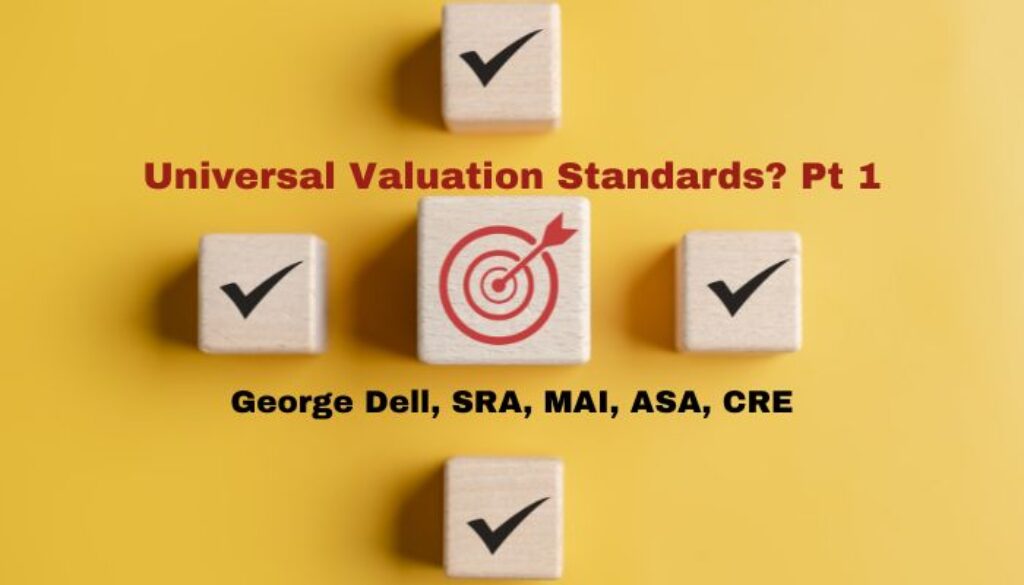The valuation “process” (algorithm and model) is universal. What does this mean?
It means that it doesn’t matter who does it, who makes decisions, or who ‘inspects’ the property. The science is the same: Systematic study through observation and experiment.
Editor’s Note: This is Standards, part 3.19 of George Dell’s series on How Do I Move to EBV? Links to the earlier posts are here.
So we seek and define the systematic study. In (opinion) appraisal, it’s called the appraisal process or valuation process. In “automated” valuation, it’s called a “model,” specifically an AVM (automated valuation model). All other hybrids, waivers, opinions, and processes are some form of a systematic process. Only one thing differs – how well done are each of the steps of the systematic study.
And what is the model for this systematic process? Simple:
Any set of universal valuation standards must address each of these four elements. It should recognize that variation or uncertainty is always there – in each of the four elements. A clear goal for any valuation must be sureness, or certainty. We recognize that some parts of any study or valuation will have high certainty – such as number of bedrooms. Features such as living area will have some lesser level of certainty. Other features, such as effective age or functional utility, are even less “certainty measurable.” And still other features, such as the amount of view, are difficult to measure, much less certain, and might even be considered subjective in nature.
As examples, we consider three current valuation paradigms: Traditional appraisal, Automated Valuation Models, and the newer EBV (Evidence-Based Valuation)© paradigm.
Legacy (traditional) appraisal: 1) The problem (scope of work) is identified by the appraiser, in collaboration with and expectations of the user/client. 2) Both the data selection and “elements of comparison” selection rely on the experience and good judgment of the appraiser. Data enhancement is done by the appraiser or a “third-party” inspector. 3) Prediction is from the selected “comparables” that are adjusted to come closer to each other, also based on the appraiser’s experience, and judgment, and other uncertain “adjustment” reckoning methods. 4) Reporting is via canned form, preprogrammed on-line forms, or spreadsheet-narrative reports (generally for non-residential assignments). Overall, the “opinion” process is founded on ethical, unbiased judgment.
AVMs: 1) The problem is identified or assumed primarily by the user/client/lender. 2) Data selection is via a programmed algorithm. No real data enhancement is attempted. 3) Prediction is via secret proprietary algorithm(s). Reporting is electronic, usually including a proprietary-secret confidence number (often FSD, or forecast standard deviation). Overall, the algorithm/process depends on decision programming by programmers, with the assistance of valuation expert “quants.”
EBV: 1) The problem is jointly identified by the client/user and asset analyst (who may be an appraiser). 2) Data selection applies analyst-augmented market similarity models, executed by your computer. 3) Prediction is via three simple, econometric fundamental algorithms: simple regression, classification, and ordinal sequencing. 4) Reporting is electronic, utilizing static and dynamic dashboards, adaptive to user need. Added analytics are possible, such as risk estimation, fundamental and forecast values.
Each of these methods provides a result. The underlying algorithm/process is identical, and is subject to a Uniform Valuation Standard (the UVS©). The only difference is who does it, and under what rules.
At Valuemetrics.Info, We Measure Markets, Not Compare Comps.
Join Us at the 3rd Annual Community of Asset Analysts Conference. For more info go to Valuemetrics.Info
Note: Universal Valuation Standards, (UVS©) are currently under development by the CAA (Community of Asset Analysts). A draft presentation will be issued at the Third Annual CAA Conference in Palm Desert January 24-26, 2023.

